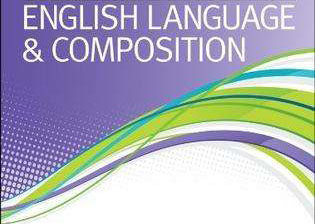COURSE DESCRIPTION

English Composition focuses on persuasion and argument that is research supported. This includes the process of locating and evaluating sources, documenting, and integrating source material into your text. In this course you will use argument to both inquire and persuade. Both argument and research are presented in the context of critical reading and writing.
Obridge Academy/St. Joseph’s College
English Composition: Style, Argument, and Research
Online: (3 credit hours)
Prerequisite: Students in 11th or 12th grade, or beyond.
Required Texts and Materials
“They Say/I Say.” The Moves That Matter in Academic Writing, with Readings; Gerald Graff, Cathy Birkenstein, Russel Durst.
Writing Spaces: Readings on Writing, volume 2. Series Editors: Charles Lowe and Pavel Zemliansky, 2011 by Parlor Press. licensed under the Creative Commons.
Additional Readings (available online)
Access to the Internet: All course materials will be available on the course Blackboard page. To access the page, go to https://obridge.blackboard.com/webapps/login/. Log in with your assigned ID# and select the class from the list. If you do not have reliable Internet access at home, plan to spend a minimum of seven hours per week at a computer lab, or in a library with computer access.
Essential Objectives
The successful student will be able to:
Consistently apply an appropriate writing process that includes planning, drafting, revising and editing.
Demonstrate in written work an awareness of the relationship among writer, subject, audience, and purpose.
Demonstrate writing proficiency with a range of rhetorical approaches to include narration, exposition, argument, and critical analysis and recognize the stylistic and structural strategies in the writing of others.
Focus written work around an explicit or an implied central thesis a position statement or proposition advanced by the writer that is arguable and supportable and develop the thesis systematically, using specific details and supporting evidence.
Compose written work that demonstrates effective use of sentence structure, paragraphing, grammar, syntax, punctuation, and spelling.
Collect, organize, and use a variety of traditional and electronic resources, critically evaluating information.
Demonstrate proficiency in research writing skills by completing one or more papers that:
Develop and support an arguable thesis in written work;
Collect, organize, evaluate and use a variety of traditional and electronic resources;
Incorporate relevant information and sources into written work; and
Appropriately acknowledge and document sources, using standard MLA style.
Course Policies
Attendance and Participation Online learning can be deceptive. Because class does not meet in a physical location, many feel that online courses are less serious. This is not true. Plan to spend at least two hours of outside work for every hour online
Participation counts for 20% of the final grade. You should be prepared to actively participate in discussions about the assigned reading and make a substantial contribution to group assignments, and peer-review activities.
Online Conduct
Be respectful of everyone in the class Demonstrate proper ‘netiquette;’ this includes refraining from negative personal comments and threats of any kind.
Grading
Formal essays: Essay 1, 10%; Essay 2, 25%; Essay 3, 25%.
Participation: Discussion and Group Work: 20%
Assignments: Research, quizzes, homework: 20%
Late Work: All assignments must be handed in on time. Late essays will be assessed a full ten points for each day after the date on which they are due and will not be accepted after three days. Blackboard assignments are due at 11:59 pm on the assigned day. Late assignments will not be accepted. This is also true of Discussion Board posts.
Plagiarism: All submitted work must be your own and must be written exclusively for this course. The use of sources (ideas, quotations, paraphrases) must be properly attributed and cited. If you are found guilty of plagiarism on an assignment, you will receive a zero for that assignment and may flunk the course and/or be referred to a judicial advisor.
Revision Process: Good writers almost always revise their work; the process of revision is an important part of learning to write. You will be required to prepare a draft as well as a final version of your essay. Preparing a draft ahead of time will give you a chance to get feedback on your work and make necessary revisions. While the draft does not receive a letter grade, the preparation of a substantial working draft and participation in peer-review count for 10% of the final grade of each essay.
In addition, preparatory work, peer-review, and revision also count toward your homework assignments and informal writing grades. Formal essays and final drafts must be prepared on a word processor and printed. Refer to the MLA Style Sheet for information on formatting your essay and citing sources.
Homework Assignments and Online Writing:
Good writing requires practice, and you will have frequent homework assignments and online (Discussion Board) writing exercises. All assignments will be graded using a rubric. It is therefore of utmost importance to understand all the rubric categories.
Teaching Method: Students will be asked to work with others frequently and should be prepared to contribute to group activities. Other modes of teaching can include short lectures (through video), discussion board posts, and Sustained Silent Literacy (SSL): a Constructivist Approach.
Office Hours and Email: Your instructor is always available through Skype and email. Your instructor will always respond to relevant and respectful e-mail messages in a timely manner. Please follow accepted “Nettiquete” guidelines, when sending e-mail, and use the standard format of a respectful e-mail.
The exact details of each class, including specific assignments and readings, will be provided before the first class session.


